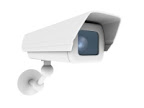The naked employee
by Jane Sissons
An increasing number of employees are becoming the unwitting victims of Big Brother-style surveillance as employers ramp up their monitoring methods.
Even prior to employment, many employers will now carry out checks on applicants.
One of the newest methods of vetting is to utilise search engines such as Google - the main aim being to trace any social networks candidates may have joined, and subsequently build up a profile of the person’s suitability for a particular role.
Another common type of workplace surveillance is ‘site-tracking’. This particular method involves management monitoring which web sites employees visit during any given day, and also searching their emails for potentially offensive material.
Other types of workplace surveillance include fingerprint scans to access buildings, so employers can pinpoint the exact moment you enter and exit the workplace. GPS trackers kept in company vehicles can also monitor employees outside the workplace.
Many people have been fired for being caught visiting porn sites, sending critical and defamatory emails about their employers, and also spending an inordinate amount of time trawling through non work-related web sites.
Fundamentally, this type of surveillance raises some serious ethical questions.
For example, what ever happened to freedom of speech? Are we no longer allowed to state our opinions privately? What kind of trust towards the employee does this demonstrate from the employer?
Maya Grey, a secretary at a major Auckland finance company, says that over six people have been fired from her workplace in the last two years as a result of employer surveillance.
“It makes me feel so anxious knowing they are continuously watching my every move,” says Ms Gray.
Author Frederick S. Lane, who penned the book The Naked Employee: How Technology is Compromising Workplace Privacy, states that surfing the web for non work-related activities can cut into productivity.
“From an employer’s perspective, having unmonitored internet access on each desk is the equivalent of installing a gazillion-channel television set for each employee,” Mr Lane states.
As technology becomes increasingly important in the workplace, the complete opposite will be true as far as employee privacy is concerned.
So the next time you’re surfing the net at work, or furiously typing emails to your mates and regailing the finer details of your private life, think on: Big Brother is watching you.
I actually agree that employees shouldn’t fritter away company time on random websites - but reading our emails is absolutely wrong, and it freaks me out they might check social sites… not because I personally have anything to hide, but on principle. The thought of them trawling around the net voraciously reading anything about you… yuck. yuck. 1984. yuck.
I know someone who contracts his IT management services to big companies, one of which got him to install the software recently. Then, rather than shaming people individually or hauling them over the coals, they list on a board in a staff area the top 10 sites of the month visited by staff . . . they’re usually Trade-me etc. . . will ask my mate if it’s working.